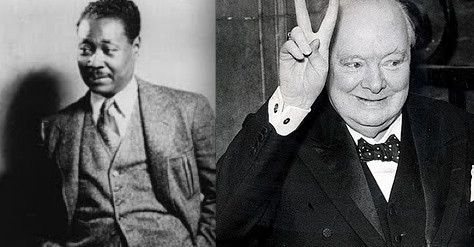Winston Churchill For Black Counterviolence?
Claude McKay and the Uses of Poetry in a Time of War

It has always been assumed that Claude McKay's sonnet, "If We Must Die" - a poem calling for counter-violence as a response to racist hatred in the context of the 1919 race riots in U.S. cities - was later recited by Winston Churchill on the BBC (and/or in a speech before the House of Commons) as a World War II-era rallying cry for Britons. McKay himself later said (in the late 40s, by which time his political views had changed) that he felt the poem to be universal - and was not about race. If indeed Churchill recited it and it could be used--presumably with pride and affirmation from its author--to rally the British against the Germans, then its historical, national/ethnic specificity would be in question.
If we must die, let it not be like hogs
Hunted and penned in an inglorious spot,
While round us bark the mad and hungry dogs,
Making their mock at our accursed lot.
If we must die, O let us nobly die,
So that our precious blood may not be shed
In vain; then even the monsters we defy
Shall be constrained to honor us though dead!
O kinsmen we must meet the common foe!
Though far outnumbered let us show us brave,
And for their thousand blows deal one deathblow!
What though before us lies the open grave?
Like men we'll face the murderous, cowardly pack,
Pressed to the wall, dying, but fighting back!
The Shakespearean sonnet--a strategic choice of form by McKay--would seem to endorse the notion of Churchill's use of the poem. After all, he chose on other occasions to buck up beset Britain by reminding them of their bard who believed in the green isle as sceptered in noblest, complexest high forms. Defense by poetic rhetoric.
I've for some time tried to find the recording of the speech in which Churchill quotes McKay's poem. No luck. I tried again recently, with some help from Emily Harnett. No luck still. We did find a footnote in a book by David Caplan that seems to conclude that Churchill's use of the poem is a myth. Here is a PDF copy of Caplan's note.
Here is a recording of McKay reciting his poem.